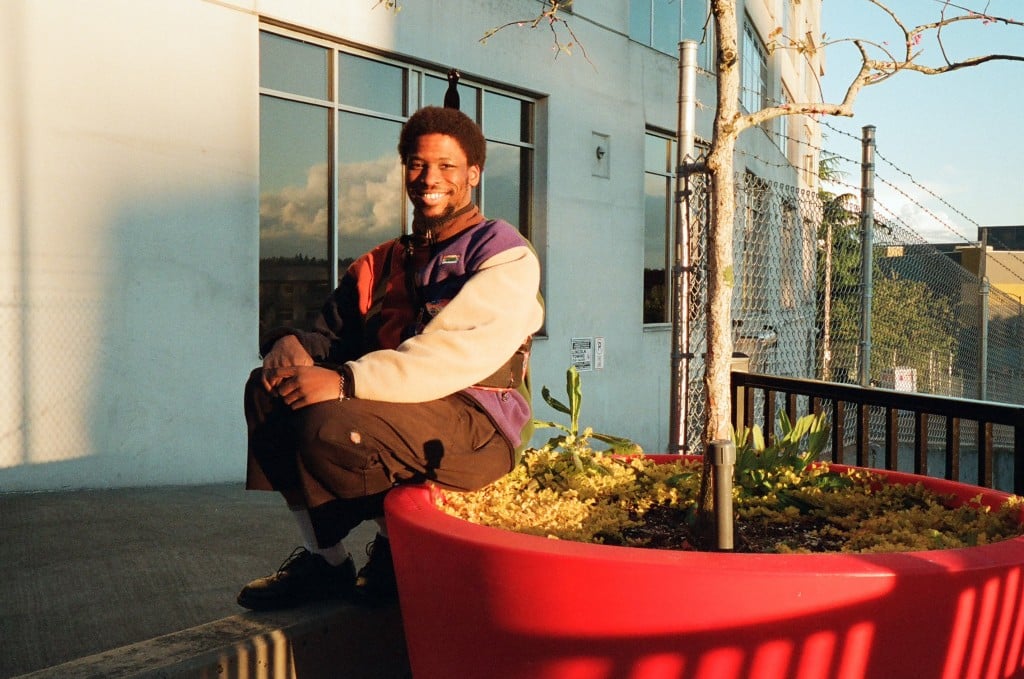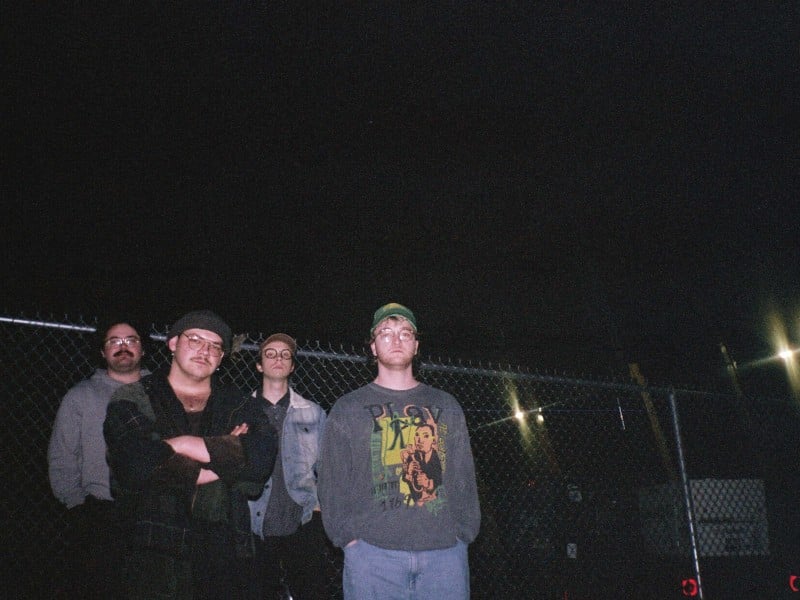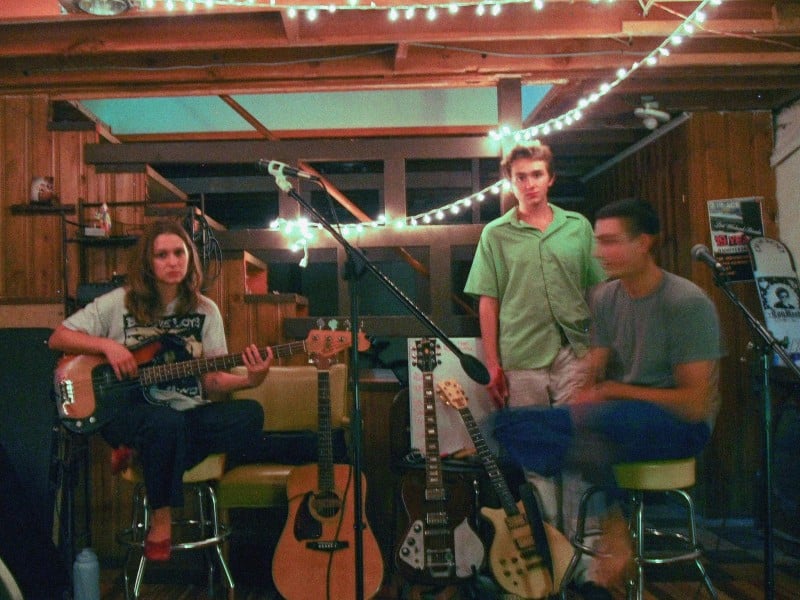
Winston Hightower’s music has taken many forms throughout the years, swinging from the lo-fi synth noise of 2021 cassette As Per My Last Email to the hardcore albums he recorded in bands such as Minority Threat and Yuze Boys. This continuous evolution, partially documented on Winston Hytwr, a new compilation album out now on K/Perennial Records, is a byproduct of the musician’s wide-ranging sonic interests and a deep-seated drive to chase down his inspirations.
“Every time I make another style of album, it’s only because I’ve either found something new or touched back on a time of my life when I was obsessed with a certain band or a certain genre. And then I get so obsessed with it that it makes me say, ‘Oh, I want to make something like this of my own,’” Hightower said by phone in mid-June, having just returned home from a tour with Soul Glo and Mannequin Pussy. “A lot of the music I make is just because I want to listen to something that I can’t find.”
Hightower traced the roots of his musical interests back to the acquisition of his first four-track recorder – a gift from Jeff Kleinman of the late, loved Columbus band Nervosas – and the creative fascination the equipment sparked within him. “I’m terrible with cars. I can’t build bikes. I can’t build a shelf,” he said. “But I was like, ‘Oh, I can build a song any day, any way.’ … And it felt exciting, because I knew once I got the pattern down, I’d be able to make songs forever.”
In compiling songs for Winston Hytwr, some of which date as far back as 2015, Hightower said he was struck by the musical and lyrical evolution on display. Some of the early songs are so densely layered, so intricately composed, that he’s unsure now how he could even perform them in concert. More recent material, in contrast, has been written with the live show in mind, lending them a more streamlined feel in comparison.
Over the same stretch, almost the inverse has taken place lyrically. While early punk rippers bordered on the purposely hollow, Hightower’s catalog has become increasingly complex over time, his more recent songs layered with political insight and deeply personal revelations. “At the time for me, the idea of punk was that it didn’t have to be serious, so it was almost like I had nothing to say,” he said. “So before I would write about nothingness, or every song was a joke or a troll. … And then as time went on, I started writing more emotionally charged songs.”
Witness “Hip Swayer,” the percolating, hypnotically rhythmic number that kicks off the musician’s new compilation, and which finds him appearing to express a sense of love and/or admiration so strong that it almost renders him unable to function. “No matter how hard I try,” he sings. “I cannot breathe/Because of thee.”
“I’m still naive, but when you’re younger and naive you think, ‘Alright, when you get to a certain age, you sign with a label. And after that, this thing will happen.’ And I just really thought I was going to have it all planned out,” said Hightower, whose perspective began to shift during the years he lived in Cleveland and released music on his tape label, the FAH-Q Catalog. “And within that, I started realizing, ‘Oh, I don’t have to put all of these limits on myself.’ And then I could really set free. And that’s when I really started putting more of myself in the music, because I wasn’t worried about who was going to hear it.”
Hightower’s willingness to approach song making absent borders is on display throughout the compilation, with songs ping-ponging from celestial synth experiments (the chiming “TF”) to propulsive, breakbeat-driven turns such as “Blind Pig,” which plays like a fractured ode to the pioneering years of hip-hop.
In curating the release, Hightower initially feared the head-swiveling experience could be jarring for some listeners, with songs lacking needed context when ripped from their respective albums and set alongside sometimes disparate tracks. “To my mind, each of these songs has like seven or eight other songs that are supposed to accompany it, where you can understand it as part of a larger concept,” he said. “I feared with this being only 12 songs that [people] would be like, ‘Whoa, this person hops from one genre to another almost in this desperate way.’ Do you know what I mean? There are artists who chase fads. … But in reality, I just had these creative spurts.”
He needn’t have worried. Though the songs pull from a wealth of musical sources, they’re unified by the jittery creative energy at their core and a sense that they were produced by a singular figure ill content to spin in place. Throughout, it appears as though Hightower has adopted an approach in line with similarly restless creative souls such as the guitarist Chris Forsyth, who once told me his slippery sound stems from a tireless push toward the outer-most sonic rings. “I was running as far in the other direction as I could,” Forsyth said, “and seeing where the edges were.”
While Hightower often works in seclusion – he recorded the bulk of the songs that appear on Winston Hytwr in his bedroom – he was initially drawn to music by the needed sense of community he uncovered early on within the form. Prior to this discovery, Hightower was part of a high school art collective that painted murals around Columbus, and he harbored designs on attending school at CCAD following graduation.
Around that time, though, the open exchange of ideas that initially compelled Hightower to make art began to curdle under the pressure of scholarship applications, introducing a sense that he was now in competition with the people he had long worked in fellowship beside.
“And that really damaged my relationship with art. … And I didn’t like that, and I actually backed out of art entirely, and I had no direction as to what I was doing,” said Hightower, who in the midst of this funk was invited by friend and fellow musician Alex Mussawir to see his band Goners perform at the punk house Legion of Doom alongside Dildo Garden and Anwar Sadat. “And I’d never seen anything like that. … It was just all of these people working together, owning their own shit, taking care of everything and looking out for one another. And it was like, ‘Oh, this is music in a community sense.’ And that brought it all together for me. After that, I never looked back.”



